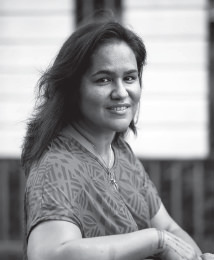
I am going to my first teenage party. There will be music, dancing, food and boys. A birthday for a girl in my class at school. I don’t know her very well. She has parties often and this is the first time I’ve been invited. Probably because it’s my first time scoring high enough in exams to come first in class. If you can’t be pretty, rich or good at sports, then you can still get invited to parties if you are clever.
I’m wearing black high heels, a denim skirt and a top with sparkles on it. I’m nervous about the heels. What if I trip?
My father sits me down for a serious talk before he drives me to the party. A talk about not behaving like ‘those afakasi’. The rich ones. The afakasi who have parties and invite each other to them. Who dress a certain way. Talk a certain way. Act a certain way. According to my father, our family doesn’t belong to that afakasi crowd because his father was a bus driver who grew taro on the side.
“They’ve always looked down on us and our branch of the aiga,” says my father.
“We’re not like them,” warns my father. “We may have a palagi last name but we have never been accepted by them. We don’t do the things they do. Or talk the way they do. Be careful and remember, you’re not like them.”
I am afakasi but not like those other afakasi. Right, got it, Dad.
Because being afakasi is about more than having a palagi last name. Yes, it means you have a palagi ancestor somewhere back on the tree. (Not a Chinese one or a meauli one.) But there are many kinds of afakasi.
There are rich afakasi families and poor ones. There are light-skinned afakasi and dark ones. There are the afakasi who are infamous for having many children from many different women. My mother has a theory. “They’re stuck with the colonial-days attitude where white men thought they could have sex with whoever they wanted to. Whenever they wanted to.” She tells us, “Never marry a man from that family. He would never be faithful to you.”
There are afakasi families who are famous for being eye-catchingly gorgeous. The men are movie-star handsome. The women are beautiful with fair skin, light hair, and palagi eyes and noses. They win pageants, become flight attendants, have their pick of the men in Apia.
There are afakasi families with buildings and plantations named after them. Whose forebears did deals that gave them vast land holdings. There are afakasi who have #nextToHeaven status because they donated land to their church, they have sons who are faifeau and priests, they have daughters who are serving God as nuns in faraway lands.
And then there are afakasi like us.
“What kind of afakasi are we?” I ask my father. But I already know the answer. Because I’ve heard it all my life.
“The Samoan kind of afakasi.” Then he adds, with our family’s usual brand of intellectual uppity-ness, “And the academic kind. We may be poor but we’re smart. We get scholarships and university degrees. Everybody knows this.” I think about my first-place-in-class achievement, the family’s satisfaction at seeing the photo in the newspaper of me accepting my trophies at prize-giving, and I nod in agreement. In that moment we are united in that most Samoan of traits. Fia-show. Appearances and family reputation are everything.
My mother chooses that moment to make a snort of derision. “There’s not much point being clever if you can’t use it to make money though, is there? We’re poor but we’re smart. So useless.”
She’s obviously having a bad day. One of her, It’s such a hard life in this country … being married to this man and his family … looking after his children …
My father and I exchange a look. Commiseration. She just doesn’t understand. Because she’s not Samoan.

‘Fitu’ was first published in Lani Wendt Young’s collection Afakasi Woman (OneTree House, 2019).
Lani Wendt Young is a Samoan/Maori author of the popular Telesā series, and is also a columnist. She’s worked as a scriptwriter for Disney and her stories for children are published by the NZ School Journal.
She was the 2018 recipient of the Douglas Gabb Australia-Pacific Journalism internship and in 2017 her reporting on climate change issues in the Pacific won her a coveted fellowship award covering the UN Climate Conference in Bonn, Germany. Lani gave to annual NZ Book Council Lecture in 2019, and in 2018 she was named the ACP Pacific Laureate.